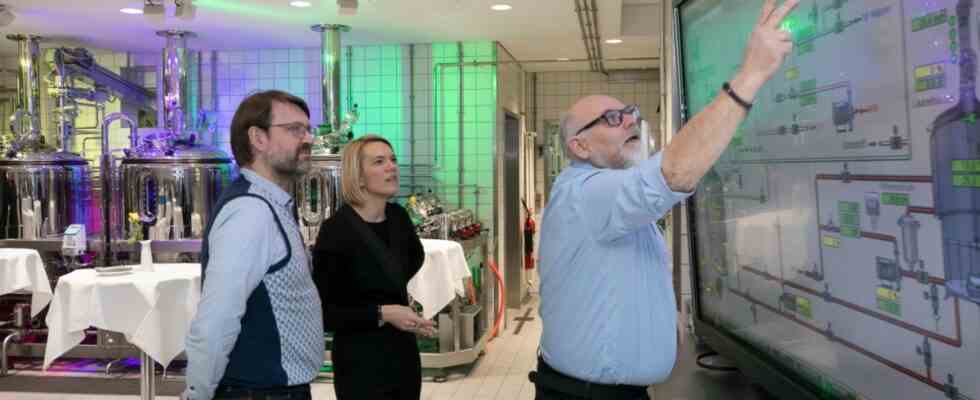A school that brews beer and has a bar sounds tempting. If it weren’t for the lack of WiFi access for the students or the constant quirks of digital technology. Vocational schools in particular have to be up to date in order to train the students appropriately for the working world, according to Gernot Raab, headmaster of the municipal vocational school for the hotel, restaurant and brewing industry. In concrete terms, this means that computer programs from business and the possibility of taking laptops or tablets from the company to the classroom are needed. IT consultant Laura Dornheim and city school board member Florian Kraus got an idea of the digitization progress during a visit to the vocational school center on Simon-Knoll-Platz. It turned out that there is still a lot of catching up to do in Munich.
Probably the biggest hurdle in the digitization of vocational schools is the end devices that the students bring with them. On the one hand, there is no WiFi access for them. One student reported that she always uses her own cell phone hotspot in class to work on her tablet. On the other hand, there are no sockets and the students have to sit around the few, unevenly distributed sockets. The teachers have problems too. Although their devices are from the city and can therefore connect to the WLAN, it sometimes takes ten minutes for the laptops to start, says a teacher.
Digital access meets security concerns
With a 45-minute lesson, that was far too long, Dornheim agreed. She now wants to ensure that students’ devices can also access the WLAN in the future. The distribution of the sockets is often due to the old buildings.
As far as industry-specific computer programs for training are concerned, the vocational school center on Simon-Knoll-Platz is actually well positioned. The kitchen, for example, uses a merchandise management program that calculates purchases for exact portions, and the brewers have modern software that allows their boilers to be precisely controlled. However, maintenance and security concerns sometimes make working with the programs more difficult.
Due to the architecture, the vocational school center on Simon-Knoll-Platz is popular with influencers.
(Photo: Florian Peljak)
A new program will soon be available for the brew kettle, which can also be controlled from home. For the vocational school, whose brewers come from all over southern Bavaria, this would significantly reduce commuting times. But allowing everyone access is a security risk that needs to be addressed first. The municipal IT service provider LHM-Services may also have to get creative with the merchandise management program, because it could soon be necessary to change the program here, as it is unclear who will take care of support in the future. The teachers fear for their database, would like – if necessary – a simple transition and, above all, a permanent position for the IT support of the school.
The city shifted responsibilities at the beginning of the year: the city’s IT service provider LHM-Services is no longer located in the Department for Education and Sport, but is assigned to the IT department. This should help, among other things, to accelerate the acquisition and troubleshooting of computer programs. The new processes first have to be implemented, but progress is already being made, says Dornheim, and it would also make sense for large school centers to have their own permanent IT positions. The city of Munich wants to have completed “the basic digitization” of all educational institutions by 2025.

